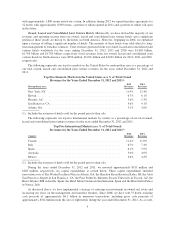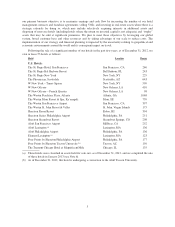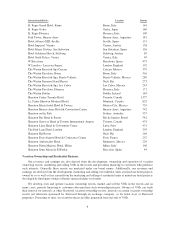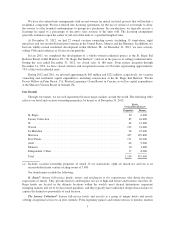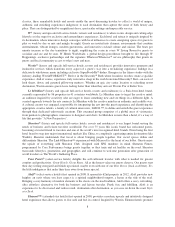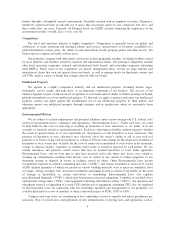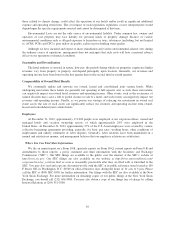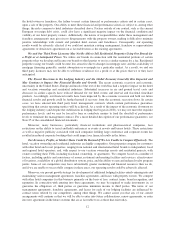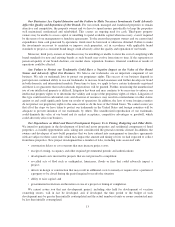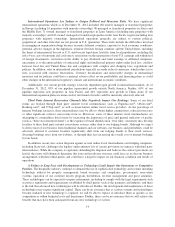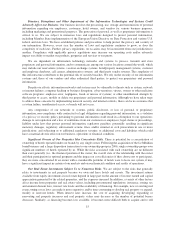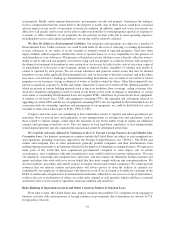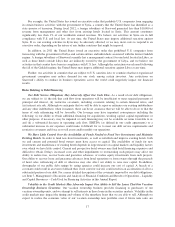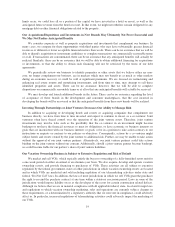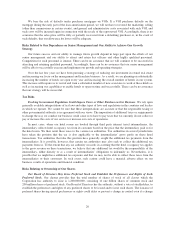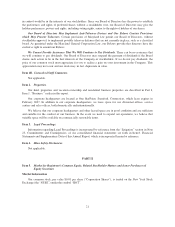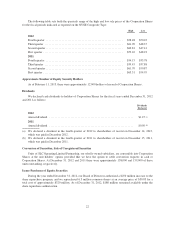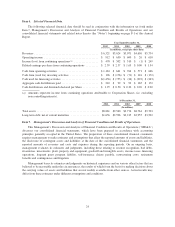Starwood 2012 Annual Report Download - page 113
Download and view the complete annual report
Please find page 113 of the 2012 Starwood annual report below. You can navigate through the pages in the report by either clicking on the pages listed below, or by using the keyword search tool below to find specific information within the annual report.International Operations Are Subject to Unique Political and Monetary Risks. We have significant
international operations which as of December 31, 2012 included 164 owned, managed or franchised properties
in Europe (including 16 properties with majority ownership); 80 managed or franchised properties in Africa and
the Middle East; 71 owned, managed or franchised properties in Latin America (including nine properties with
majority ownership); and 243 owned, managed or franchised properties in the Asia Pacific region (including four
properties with majority ownership). International operations generally are subject to various political,
geopolitical, and other risks that are not present in U.S. operations. These risks include the difficulties involved
in managing an organization doing business in many different countries, exposure to local economic conditions,
potential adverse changes in the diplomatic relations between foreign countries and the United States, including
the threat of international boycott or U.S. anti-boycott legislation, hostility from local populations, including the
risk of war, acts of terrorism and civil unrest, restrictions on the repatriation of non-U.S. earnings and withdrawal
of foreign investments, restriction on the ability to pay dividends and remit earnings to affiliated companies,
uncertainty as to the enforceability of contractual rights and intellectual property rights under local law, conflicts
between local law and United States law and compliance with complex and changing laws, regulations and
policies. In addition, sales in international jurisdictions typically are made in local currencies, which subject us to
risks associated with currency fluctuations. Currency devaluations and unfavorable changes in international
monetary and tax policies could have a material adverse effect on our profitability and financing plans, as could
other changes in the international regulatory climate and international economic conditions.
Additionally, our current growth strategy is heavily dependent upon growth in international markets. As of
December 31, 2012, 85% of our pipeline represented growth outside North America. Further, 60% of our
pipeline represents new properties in Asia Pacific and 44% represents new growth in China alone. If our
international expansion plans are unsuccessful, our financial results could be materially adversely affected.
Third Party Internet Reservation Channels May Negatively Impact Our Bookings. Some of our hotel
rooms are booked through third party internet travel intermediaries such as Expedia.com®, Orbitz.com®,
Booking.com®, and CTrip.com®, as well as lesser-known online travel service providers. As the percentage of
internet bookings increases, these intermediaries may be able to obtain higher commissions, reduced room rates
or other significant contract concessions from us. Moreover, some of these internet travel intermediaries are
attempting to commoditize hotel rooms by increasing the importance of price and general indicators of quality
(such as “three-star downtown hotel”) at the expense of brand identification. Over time, consumers may develop
loyalties to these third party internet reservations systems rather than to our lodging brands. Although we expect
to derive most of our business from traditional channels and our websites, our business and profitability could be
adversely affected if customer loyalties significantly shift from our lodging brands to their travel services,
diverting bookings away from our websites, or through their fees increasing the overall cost of internet bookings
for our hotels.
In addition, recent class action litigation against several online travel intermediaries and lodging companies,
including Starwood, challenges the legality under antitrust law of certain provisions in contracts with third party
intermediaries. While the company is vigorously defending the litigation and believes the contract provisions are
lawful, the courts will ultimately determine this issue and an adverse outcome could force us to alter our business
arrangements with these third parties and could have a negative impact on our financial condition and results of
operations.
A Failure to Keep Pace with Developments in Technology Could Impair Our Operations or Competitive
Position. The hospitality industry continues to demand the use of sophisticated technology and systems including
technology utilized for property management, brand assurance and compliance, procurement, reservation
systems, operation of our customer loyalty program, distribution, revenue management and guest amenities.
These technologies can be expected to require refinements, including to comply with the legal requirements such
as privacy regulations and requirements established by third parties such as the payment card industry, and there
is the risk that advanced new technologies will be introduced. Further, the development and maintenance of these
technologies may require significant capital. There can be no assurance that as various systems and technologies
become outdated or new technology is required, we will be able to replace or introduce them as quickly as our
competition or within budgeted costs and timeframes. Further, there can be no assurance that we will achieve the
benefits that may have been anticipated from any new technology or system.
14


